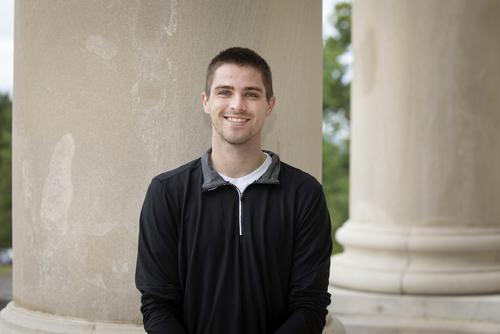Biology and Biomedical Sciences Major
Continue to main content
Biomedical Sciences (BS) Degree Map
Explore the courses you'll need to complete your biology and biomedical sciences degree.
Start a Seamless Pathway to Medical School
Southeast Missouri State University and the Lake Erie College of Osteopathic Medicine have partnered to provide SEMO students with a seamless transition to medical school. Are you exploring osteopathic medicine, pharmacy, dental medicine, or podiatric medicine? This pathway gets you on track for success.
Professional Partnerships
Our agreement with St. George’s University guarantees all SEMO graduates from the pre-medical or biomedical sciences programs who meet the requirements gain admission into its accredited School of Medicine.
Biomedical Science Major Outcomes & Careers
-
$253k
Physician
According to the Bureau of Labor Statistics, the mean annual salary for physicians and ophthalmologists is $253,470.
-
$136k
Physician Assistant
According to the Bureau of Labor Statistics, the mean annual salary for a physician assistant is $136,900.
-
$112k
Medical Scientist
According to the Bureau of Labor Statistics, the mean annual salary for a medical scientist is $112,690.
The biology biomedical sciences major curriculum includes core coursework to prepare you for any area of biology. You’ll complete a minimum of 120 credit hours to complete this degree, including the general education requirements and at least 39 senior division hours.
Required Courses:
- BI163 Evolution & Ecology (4)
- BI173 Cell & Organismal Biology (4)
- BI283 Genetics (4)
- BI389 Career Development in Biology (2)
- CH184 General Chemistry I Lab (1)
- CH185 General Chemistry I (3)
- MI101 Introduction to Microcomputer Applications (3)
Choose one math course:
- MA116 Precalculus A (3)
- MA137 Precalculus (5)
- MA139 Applied Calculus (3)
- MA140 Analytical Geometry & Calculus I (5)
Experiential Learning Requirement: 2 hours
- BI551-553 Biology Field Studies (2)
- BI563-565 Experience in Museum Curation (1-3)
- BI570 Development of Instructional Materials (1)
- BI582 Internship in Biology (1-3)
- BI589-591 Biological Research (1-3)
Biomedical Sciences Option Required Courses:
- BI310 General Microbiology (4)
- ZO310 Zoology (4)
- ZO331 Vertebrate Physiology (3)
Choose 3courses (9-12 hrs):
- BI403 Medical Genetics (3)
- BI404 Cell Biology (3)
- BI408 Biological Microscopy (4)
- BI413 Molecular genetics (3)
- BI421 Bacterial Genetics (4)
- BI439 Cellular Mechanisms of Disease (3)
- BI442 Immunology (4)
- BI543 Pathogenic Microbiology (4)
- ZO315 Comparative Anatomy (4)
- ZO451 Vertebrate Histology (3)
Choose 6 hours:
- Any BI, BO, ZO, or BT prefix (6)
Non-Biology Requirements:
- CH 186 General Chemistry II (3)
- CH 187 General Chemistry II Lab (1)
- CH341 Foundations of Organic Chemistry (4)
- CH342 Organic Chemistry Lab I (1)
- MAxxx Additional math (for which MA116 is a prerequisite) (3)
- PH120 Introductory Physics I (5)
- PH121 Introductory Physics II (5)
Some requirements may be fulfilled by coursework in major program.
- Social and Behavioral Sciences – 6 hours
- Constitution Requirement – 3 hours
- Written Communication – 6 hours
- Oral Communication – 3 hours
- Natural Sciences – 7 hours (from two disciplines, one to include a lab)
- Mathematics – 3 hours
- Humanities & Fine Arts – 9 hours (from at least two disciplines)
- Additional requirements – 5 hours (to include UI100 for native students)
- Civics examination
First Year
Fall Semester (15-17 Hours)
- UI100 (1)
- BI163/063 (4)
- CH184/185 (4)
- MA116/137/139/140 (3-5)
- MI101 (3)
Spring Semester (14 Hours)
- BI173/073 (4)
- CH186 (3)
- CH187 (1)
- EN100 (3)
- Additional Math course (3)
Milestone: achieve a target cumulative GPA of 3.2
Second Year
Fall Semester (14 Hours)
- BI283/083 (4)
- BI389 (2)
- CH341 (4)
- CH342 (1)
- General Education (3)
Spring Semester (15 Hours)
- BI310 or ZO310 (4)
- CH343* (3)
- CH344* (2)
- General Education (3)
- General Education (3)
Milestone: achieve a target cumulative GPA of 3.2
(Summer courses are encouraged to avoid 18-hour semesters)
Third Year
Fall Semester (17 Hours)
- PH120/020 (5)
- Biology upper-level elective (3)
- Biology Elective (3)
- General Education (3)
- General Education (3)
Spring Semester (16 Hours)
- ZO331 (3)
- PH121/021 (5)
- Experiential Learning Req (2)
- General Education (3)
- General Education (3)
Milestone: take the admission test and apply to the professional program
Fourth Year
Fall Semester (16 Hours)
- Biology upper-level electives (3)
- General Education (3)
- Elective (3)
- Elective (3)
- Elective (3)
Spring Semester (15 Hours)
- Biology electives (3)
- Biology upper-level electives (3)
- Elective (3)
- Elective (3)
- Elective (3)
Milestone: achieve a target cumulative GPA of 3.2
A “Milestone” signifies a significant stage for a student in the completion of a degree.
* Recommended for program; consult advisor
What will it cost?
Become a Redhawk.
Do more than dream about the future. Take the first steps to make it all happen.
Hands-on Learning
You’ll gain hands-on real-world experience through a required 80 hours outside the classroom shadowing doctors and nurses, working in hospitals, or conducting laboratory research with faculty.
Getting the Job
Your education is just one piece to launching an extraordinary career. Once you’ve mastered the material, you still have to find the job you want, make the right connections, and sell your knowledge and experience—if all this is giving you anxiety, don’t panic. SEMO’s Career Services office is here to help you with the next step. Our boldly supportive faculty will provide the expertise and support you need, so you’re landing your dream job in no time.
Alumnus
"Conducting research gave me a sense of which medical programs I am interested in applying to as well as specialties I am considering after my training. I’ve worked in a wide range of labs on campus, which has prepared me for the research I want to do in medical school."
Andrew Behrmann

Cape Girardeau, Missouri 63701

